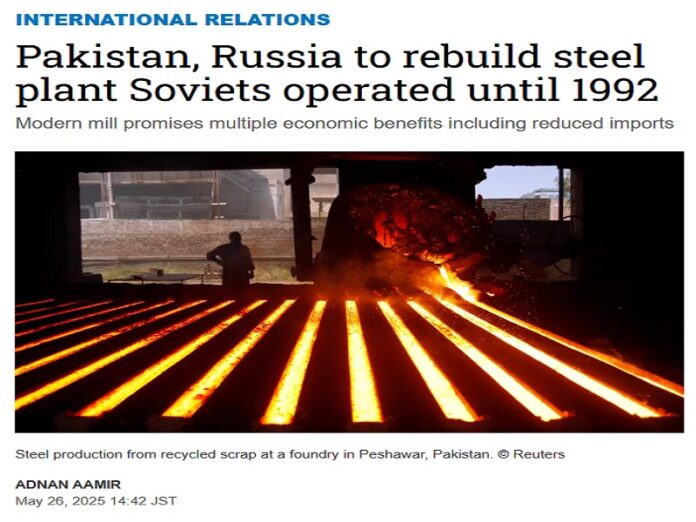South Asian geopolitical discourse on social media has been dominated over the past week by reports that Russia clinched a multibillion-dollar deal with Pakistan to rebuild its steel mill in Karachi, which was established with Soviet support in 1973 and partially run by its officials till 1992. According to Nikkei Asia’s Adnan Aamir, whose report about this circulated more widely than any other, “The agreement was made [earlier in May] during a meeting between Russia’s Denis Nazarov and Haroon Akhtar Khan”.
Having allegedly been reached right after the latest Indo-Pak conflict, in which Russia was surprisingly neutral, it was naturally celebrated by Pakistanis and condemned by Indians. Although the reported deal would be an apolitical one, the consequent reduction of Pakistani steel imports, associated alleviation of its foreign exchange crisis, and strengthening of its domestic industry could have strategic implications for Pakistan vis-a-vis its rivalry with India. This explains each society’s polar opposite reaction to it.
Pakistan’s publicly financed PTV World reported last Friday that “Global media terms Russia-Pakistan strategic partnership a major diplomatic setback for India”, yet later that day, Russia’s publicly financed Sputnik India denied the existence of any deal such deal: “While negotiations did take place, Sputnik India was unable to find any proof that a ‘multibillion dollar contract’ has been signed. Worth noting that this ‘news’ was first reported by Nikkea Asia that CEASED reporting from Russia back in 2022.”
India’s publicly financed All India Radio then reported the following before day’s end: “Moscow firmly denied any signed multibillion-dollar deal, accusing elements in Pakistan of trying to disrupt the strong India-Russia strategic partnership, especially after India’s recent Operation Sindoor targeting terror camps in Pakistan and PoK. A senior Russian official called the reports exaggerated and said they aim to sensationalize ties that do not exist at such a scale.”
Their report and Sputnik India’s fact check earlier on Friday suggest that while there’s substance to these reports, seeing as how the latter confirmed that “negotiations did take place”, Nikkei Asia’s Aamir either erred in misreporting that a deal was agreed to or was deliberately misleading in order to stir trouble. According to Pakistan’s Ministry of Information and Broadcasting, all that was agreed to on 13 May was “to form a joint working group” on building a new steel mill, which isn’t the same as clinching a deal.
This doesn’t mean that they might not one day sign a “multibillion dollar contract”, but just that this hasn’t yet happened, which is important since the timing right after the latest Indo-Pak conflict could have inadvertently harmed Indians’ perception of Russia even though Moscow has no hostile intentions. It thus appears to be the case exactly as All India Radio reported citing that unnamed senior Russian official that these reports “aim to sensationalize (Russian-Pak) ties” in order to disrupt Russo-Indo ones.
A lot of people were genuinely fooled by Aamir’s article for Nikkei Asia, the framing of which was either an innocent mistake on his part or perhaps indicative of more devious intentions, and therefore unwittingly contributed to this information warfare operation. In any case, what this report and the regional reaction to it on social media showed is that everyone now accepts how successful the Russian-Pakistani rapprochement has been, but Pakistanis and Indians obviously assess it very differently.







